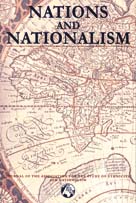Article contents
British and Irish conflict regulation from Sunningdale to Belfast. Part II: Playing for a draw 1985–1999
Published online by Cambridge University Press: 01 July 2000
Abstract
The fundamental improvement between the Sunningdale and Belfast (or Good Friday) Agreements as conflict regulation processes is the recognition of opposing nationalisms as the core cause of conflict and, by extension, the development of a more symmetrical intergovernmental relationship between British and Irish governments which maximised the basis of consent for addressing conflicting claims to national self-determination. While the Agreement reflects a liberalisation of opposing nationalisms, it does not represent a ‘post-nationalist’ solution; the evolution of conflict regulation from 1985 to 1998 reflects a bi-national trend. The key to cultivating a ‘ripe moment’ for a constitutional settlement was based on the recognition that Northern Ireland's constitutional status needed to be redetermined and that the processes of self-determination needed to address and modify ‘constitutive’ aspects of sovereignty which preceded partition, as well as ‘regulative’ aspects which have evolved since the Anglo-Irish Agreement of 1985.
- Type
- Research Article
- Information
- Copyright
- © 2000 Association for the Study of Ethnicity and Nationalism
- 8
- Cited by




